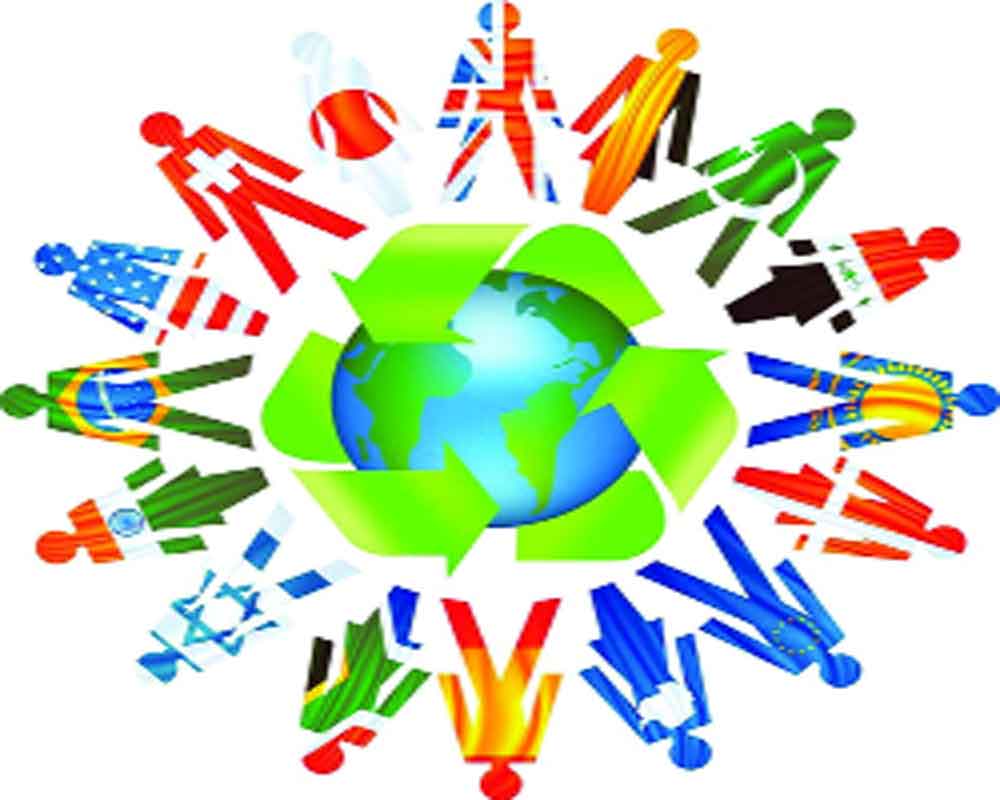We must have a global open society that has some sort of State control in certain sectors and constantly strives to correct and improve, says Rajyogi Brahmakumar Nikunj Ji
Globalisation is seen as a planetary phenomenon, which has several different aspects including informational, cultural, economic or political. Although considered by some as beneficial, it has been called into question by other analysts for its disastrous effects on developing nations.
The last two decades have seen the world moving towards globalisation of trade, commerce and free-market economy. The academic economists believe that these steps would give a spurt to forces of competitiveness, efficiency which in turn would lead to better job opportunities and generation of wealth and prosperity.
However, one has to take into account not just these benefits but also the overall consequences of globalisation and free play of market forces. One thing that no one can deny is that every human action emanates from a person’s awareness of a set of values and globalisation, too, is based on a set of values. Competitiveness, efficiency, and more form just one set of values and one has to see what kind of forces these values further set in motion and what is the overall effect or result of these forces on the society as a whole and not just on the businessmen and industrialists and their employees who constitute only a fraction of the society.
As everyone knows, globalisation is only a small part of the economic philosophy or policy and one must know the all- inclusive world-view or philosophy of which it forms a part. Without viewing it in context, one may develop an erroneous view. Globalisation of business and trade without viewing the society as a global family would lead to social tensions and economic strife and this is what we are experiencing today. Also, globalisation in economics is an outward-looking view and if it has no corresponding inward-looking view, it would unleash bitter competition. In the absence of the inward-looking balancing forces, it would lead to stark materialism and commercialism, diminishing or setting at naught the values of sympathy, kindness, compassion, world-brotherhood, cooperation and so on. Thus, it would not only destabilise the financial markets but create disharmony in human relations too. It would then become a potent antithesis of the moral and spiritual view. Hence it should be clearly understood that globalisation in business and trade, without its spiritual counterpart, would be a distorted value. Moreover, it’s a known fact that capital has a tendency to flow from countries which have free market economy to countries where it has better chance of profit by employing cheap labour, available resources, and so on. On the other hand, it is not easy for labour to go to places where it has better prospects because it has emotional ties with family and is affected by family circumstances. Thus, due to better mobility and flexibility of capital in contrast to that of labour, it is the international portfolio of investors that benefit rather than the labour. Thus, globalisation would result in disproportionate profit for those who can invest capital and uneven distribution of benefits as well as social and economic deprivation.
Further, in a free market economy, every player in the manufacturing sector would drive others out of the market and thus competition would would accentuate instability in financial markets. Thus the whole economy would never return to equilibrium. In this state of instability, the business and industrial class would adopt unfair means to prevent any dwindling of its profit and thus, the whole atmosphere would be vitiated for the portfolio investors would try to take the politicians and the bureaucrats with them in order to survive or thrive. This would further give rise to corruption, black money and other evils. Thus, it is strange that our leaders talk of moral values on the one hand and of globalisation on the other hand without making any efforts to popularise a global spiritual view of society as a global family.
Further, the more powerful a country, the greater is its ability to manoeuvre the world-economy to suit its own interests. One can see that the major economic powers today dominate the multilateral trading system. They define and redefine globalisation to suit their own national interests or the vested interests of their billionaires. This leads to clash of interest and instability. In order to assess merits or demerits of a system, one should also examine its ideological base and take note of its consequences. We should question why we want a free market economy or a state-controlled one. We should be clear about our goal and see whether a particular form of economy takes us towards that goal. If our goal is to remove poverty and great economic disparity and to have a society based on economic justice and fairplay, then we should sort out whether globalisation or state-controlled economy can do it better. This should be judged by those who are neutral and have no vested interests in either form of economy. So, if in the present context, we must have globalisation, then we should have a global open society that has some sort of State control in certain sectors and constantly strives to correct and improve. In any case, a happy blend of economics and spirituality — both based on values — is necessary and in the process of decision-making, involvement of neutral institutions would be beneficial.


























